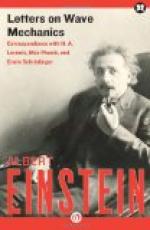|
This section contains 1,432 words (approx. 5 pages at 300 words per page) |

|
Erwin Schrödinger was born in Vienna, Austria. After his years at the Gymnasium, where he was given a strong education in classics and in science, he studied physics and mathematics at the university of Vienna from 1906. His major teachers were the successors of Ludwig Boltzmann: Franz Exner and Fritz Hasenöhrl. Schrödinger's early interest for philosophy is evident in several manuscripts of this period, which contain reflections about Greek and Indian thought and British empiricism. He was then awarded the D. Phil. Degree in 1910 and became assistant experimental physicist in Exner's laboratory in 1911. From this date until 1922, he worked on several subjects, including atmospheric radioactivity, statistical physics, psycho-physics of sensations, general relativity, and atomic physics.
At the end of World War I, in which Schrödinger served as an artillery officer in the Austrian army, he...
|
This section contains 1,432 words (approx. 5 pages at 300 words per page) |

|


